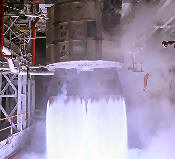 A 68-year-old New Jersey man, Juwhan Yun, was arrested last month and pleaded not guilty to charges that he illegally brokered the sales of rocket engines and related technology from Russia to South Korea in violation of Part 129 of the International Traffic in Arms Regulations. Under Part 129, a license from the Department of State is required before any U.S. person can broker the sale of Category I Missile Technology Control Regime Annex items regardless of value and regardless of destination. (License requirements for other defense articles and defense services depend upon, among other thing, the value of the brokered items and the destination of those items). The defendant, who had previously been convicted for attempting to export sarin nerve gas to Iran, had not obtained such a license.
A 68-year-old New Jersey man, Juwhan Yun, was arrested last month and pleaded not guilty to charges that he illegally brokered the sales of rocket engines and related technology from Russia to South Korea in violation of Part 129 of the International Traffic in Arms Regulations. Under Part 129, a license from the Department of State is required before any U.S. person can broker the sale of Category I Missile Technology Control Regime Annex items regardless of value and regardless of destination. (License requirements for other defense articles and defense services depend upon, among other thing, the value of the brokered items and the destination of those items). The defendant, who had previously been convicted for attempting to export sarin nerve gas to Iran, had not obtained such a license.
I’ve reviewed the criminal complaint filed against Juwhan Yun and can only say that the government doesn’t appear to have a slam-dunk case here. The complaint details a number of emails and face-to-face meetings between Yun and a confidential government informant which explored the possibility of the informant obtaining RD-180 rocket engines and technology from Russia for the South Korean government. Since the engines and technology were to be transported from Russia, and not the United States, to South Korea, no illegal export would be involved and the only possible charges would be under the brokering regulations in Part 129.
The prosecutors, however, appear to have completely misunderstood the definition of brokering set forth in Part 129. Section 129.2(a) defines brokering as acting as an agent for others in the transfer of defense articles or services in exchange for a commission or other consideration. Allegations from the criminal complaint indicate that Yun wasn’t acting as an agent for the South Korean government in exchange for a commission or other consideration from the government. Rather he was acting in an individual capacity and was intending to purchase the items for his own account for later resale to South Korean government.
Here’s the relevant passage from the criminal complaint:
On February 25, 2009, JW Yun sent an email to the [Confidential Informant] and asked the [Confidential Informant] how much commission the [Confidential Informant] and the people in Moscow wanted as he would include that in the sale price to Korea.
If Part 129 is read to cover Yun’s activities, then every person or company that distributes defense articles is a broker and required to register under Part 129, a position that the DDTC has so far not taken.
The criminal complaint also reveals that the Confidential Informant requested that Yun provide him with a letter from the South Korean government indicating that Yun was authorized to act on their behalf. Yun responded by stating that he didn’t have such a letter and that the South Koreans would never give him such a letter.
Even supposing that a person selling defense items that he owns can ever be considered a broker under the definition set forth in Part 129, a questionable proposition at best, the prosecution still has to prove a scienter element, i.e., present some evidence that Yun knew that his actions were unlawful. Leaving aside the issue that a reasonable person might not read the definition of brokering to cover what Yun was doing, Yun went to considerable pains to stress to the Confidential Informant that everything in the transaction must be legal because he wanted this to be a long-term relationship, not simply a one-shot sale of rocket engines.
On February 11, 2009, JW Yun sent an email . . . advising the [Confidential Informant] that “all of our business should be legitimate and lawful because our business should be continued one after another in the future.”
Nor is their any indication in the criminal complaint that Yun tried to conceal his activities or otherwise indicated that he thought they were illegal. Yun discussed the proposed sale of the rocket engines with the Confidential Informant in front of third parties that Yun did not know. He indicated that he was seeking to enlist the services of a rocket engineer from the University of Central Florida to assist him in the transaction. He even sent the confidential informant a signed and notarized written agreement authorizing the informant to act on Yun’s behalf in obtaining the engines and technology from Russia for export to South Korea. That certainly doesn’t seem to be something that would be done by someone who thought that he was breaking U.S. law by attempting to buy Russian rocket engines for resale to South Korea.
 Permalink
Permalink
Copyright © 2009 Clif Burns. All Rights Reserved.
(No republication, syndication or use permitted without my consent.)

 Posted by
Posted by  Category:
Category: 

